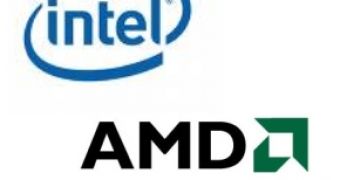AMD announced a few days ago spinning off its manufacturing facilities into a separate firm known as The Foundry Company in an attempt to put behind a lot of financial problems the chip maker faced during the past few quarters and to turn to profitability. Reactions to the announcement have already started surfacing, and the first one comes from Intel, which is said to question AMD's action of dividing its businesses.
It seems that the Sunnyvale chip maker being on the verge of spinning off its manufacturing plants interacts with a cross-licensing agreement Intel and AMD have. Microprocessor design and manufacturing are regulated by this agreement. As an example, AMD pays Intel royalties for an x86 license, which seems to be an aspect of the licensing agreement the two companies have inked.
"Intel has serious questions about this transaction as it relates to the license and will vigorously protect Intel’s intellectual property rights," said Intel's spokesman Chuck Mulloy in an interview.
It appears that the agreement prevents AMD from sharing or transferring any of Intel's technologies to third parties. This also implies that, if AMD is acquired by another company, the new firm will not be able to make x86 microprocessors or make use of any of Intel's technologies. The agreement also stipulates that AMD is limited to outsourcing only 20 percent of its total output. This would be a problem for the chip maker, since its plan to spin off its manufacturing facilities into a new company means that its entire production will actually be contracted.
Intel's x86 cross-licensing agreement and its transferability also influence companies like Nvidia and VIA, which may imply that Intel is effectively controlling competition. Intel says it is ready to defend its patent rights, yet the giant chip maker also needs AMD to be in a competitive position, otherwise the company may find itself targeted by some anti-competitive reactions from other firms. Intel had some litigation with AMD in the past, as well as with other industry players and governmental institutions.

 14 DAY TRIAL //
14 DAY TRIAL //